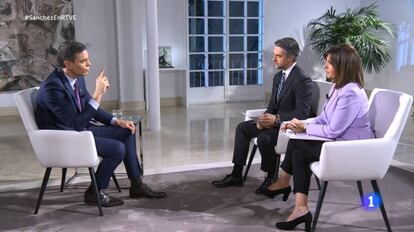Spanish prime minister announces date of meeting with Catalan premier
In his first interview since being sworn back into office, Pedro Sánchez said he would see Quim Torra in February, and promised to have a new budget passed by summer

Spanish Prime Minister Pedro Sánchez will meet with Catalan premier Quim Torra the first week of February in Barcelona to discuss issues relating to Catalonia. The meeting is part of the agreement the leader of the Socialist Party (PSOE) made with the separatist Catalan Republican Left (ERC) in order to ensure he could be sworn back into office by Congress. The ERC agreed to abstain from Sánchez’s investiture bid on the condition that the PSOE commit to negotiations about the political situation in Catalonia and the future of the region.
The right has a problem and can’t accept the election results
Prime Minister Pedro Sánchez
“We have agreed with the ERC to a bilateral commission between governments that is perfectly constitutional to resolve this political crisis,” Sánchez said on Monday night in a television interview with Spain’s public broadcaster TVE, the first he has given since being voted back in as prime minister.
“We are aware that there are deep differences: [the Catalan separatist parties] are defending the right to self-determination, and we are defending self-rule. We want to vote for an agreement, not a disagreement, which is what happens in a referendum,” he added.
The negotiations are also key to ensuring that the PSOE and anti-austerity Unidas Podemos coalition is able to pass a new budget. The government, which lacks an absolute majority in Spain’s lower house of parliament, needs the ERC to abstain from the vote in order to push through its financial plans in Congress. But without talks, “there will be no political term,” warned ERC congressional spokesman Gabriel Rufián during the investiture debate to swear in Sánchez. The prime minister’s earlier failure to secure approval for his 2019 budget blueprint led to early elections in April of last year, followed by a repeat vote of November. The prime minister, however, said he is confident that he can have a new budget approved “before the end of summer” in September.
During the interview, Sánchez added that he wanted to seek solutions to the situation in Catalonia outside of the courts. “Politicians cannot stand behind the Supreme Court. There has been neglect of duties, a failure of politics,” he said.
Sánchez also announced that he wanted to meet not just with Torra, but with all regional leaders in Spain. “This time I will be the one who goes to the government headquarters. This legislature has to be one of consensus,” he said. No Spanish prime minister has ever before visited the Spanish regions in this way.
Political U-turn
At the outset of the interview, Sánchez was shown footage of himself defending positions that have since radically changed: for example, a commitment that he would not talk with Torra and him saying that the biggest obstacle to a coalition government with Unidas Podemos was its leader Pablo Iglesias – who is now a deputy prime minister.
On why he had done these political U-turns, Sánchez maintained his composure and explained: “In politics, reality comes before your wishes. And the people make reality. They spoke at the [November 10] elections and said that they wanted a progressive coalition. I understood this and I accepted it. Hopefully others can too and will not obstruct us,” he said, in reference to the conservative Popular Party (PP), which has vowed to fight the new government every step of the way.
The prime minister also criticized the PP for working with the far-right party Vox, which has struck governing agreements with the party in many regions and city halls, and for failing to address the crisis in Catalonia. According to Sánchez, the problem has fallen to the new government due to the “inaction” of former Prime Minister Mariano Rajoy of the PP. It was during Rajoy’s time in office that the illegal referendum of 2017 was held, followed by a unilateral declaration of independence.
“When the PSOE is in government, there are always problems, conflicts. The right has a problem and can’t accept the election results. They are bad losers. We have had 40 years of democracy,” he said.
English version by Melissa Kitson.
Tu suscripción se está usando en otro dispositivo
¿Quieres añadir otro usuario a tu suscripción?
Si continúas leyendo en este dispositivo, no se podrá leer en el otro.
FlechaTu suscripción se está usando en otro dispositivo y solo puedes acceder a EL PAÍS desde un dispositivo a la vez.
Si quieres compartir tu cuenta, cambia tu suscripción a la modalidad Premium, así podrás añadir otro usuario. Cada uno accederá con su propia cuenta de email, lo que os permitirá personalizar vuestra experiencia en EL PAÍS.
¿Tienes una suscripción de empresa? Accede aquí para contratar más cuentas.
En el caso de no saber quién está usando tu cuenta, te recomendamos cambiar tu contraseña aquí.
Si decides continuar compartiendo tu cuenta, este mensaje se mostrará en tu dispositivo y en el de la otra persona que está usando tu cuenta de forma indefinida, afectando a tu experiencia de lectura. Puedes consultar aquí los términos y condiciones de la suscripción digital.









































